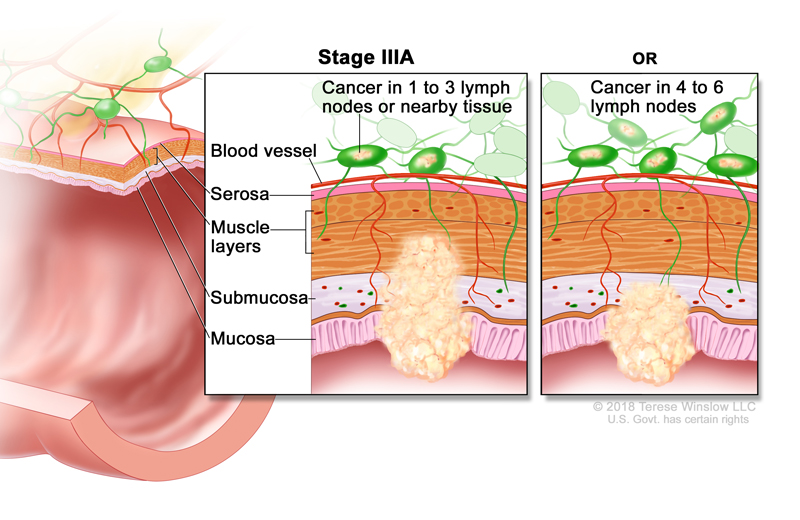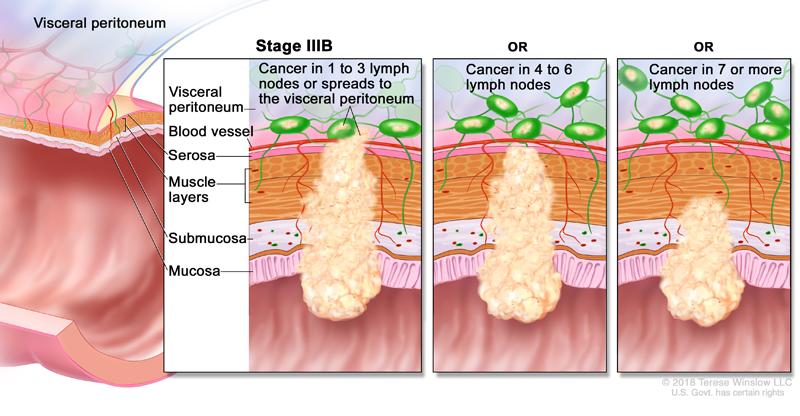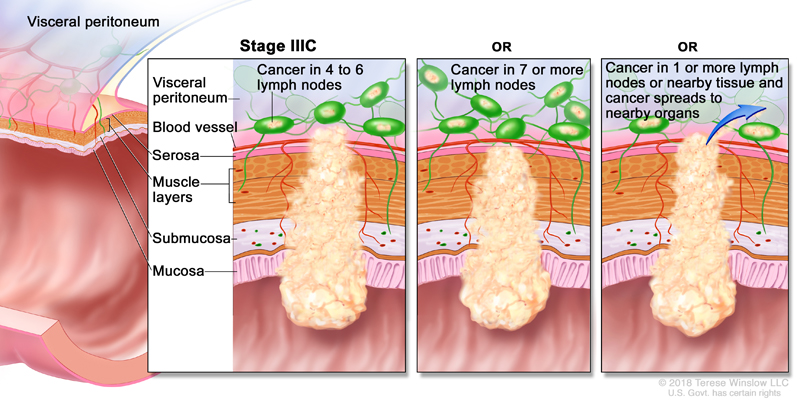Stage 3 Colon Cancer ICD 10 is C18.9.
Tap “Watch Now” for an easy-to-understand overview of Stage 3 Colon Cancer.
- Stage 3A Colon Cancer
- Stage 3B Colon Cancer
- Stage 3C Colon Cancer
Overview
Stage 3A Colon Cancer diagnosis is when:
A) The cancer has spread to the intermediate layers of your colon, called the Submucosa or Muscle layers and has affected 1-3 of your lymph nodes or nearby tissue as shown in the left image,
or
B) The cancer has only spread to the superficial layers of your colon called the mucosa and submucosa and has affected 4-6 lymph nodes as shown in the image on the right.
What Tests Will I Need and Why?
Blood and Imaging tests are done to understand your general health, confirm your diagnosis and determine your cancer stage.
A test, called a Colonoscopy, is usually the first step to see if there is a tumor inside of your colon and if needed, to take tissue samples for analysis. This test, inserts a thin tube with a camera into your anus to see the inside of your colon.
Tissue analysis is also typically done through a biopsy to identify the cancer cell type, which is critical to finding the best treatment option for you.
Re-read this summary as needed and then tap, “Compare My Treatment Options Now“. Our unique Comparison Page will help you understand your FDA-approved treatment options including, who can help you pay for your treatment, where and how each is given and what side-effects you may experience.

National Institute of Health/ treatment-colon
Overview
Stage 3B Colon Cancer is when one of the following is taking place:
1. The Cancer has spread to the deepest layer of your colon called the Serosa or the tissue that covers most of the organs in your abdomen called the visceral peritoneum or has affected 1-3 lymph nodes seen here on the left.
or
2. The Cancer has spread to 4-6 lymph nodes shown here in the middle image,
or
3. The Cancer has spread to the top and intermediate layers of your colon and has affected 7 or more lymph nodes.
What Tests Will I Need and Why?
Blood and Imaging tests are done to understand your general health, confirm your diagnosis and determine your cancer stage.
A test, called a Colonoscopy, is usually the first step to see if there is a tumor inside of your colon and if needed, to take tissue samples for analysis. This test, inserts a thin tube with a camera into your anus to see the inside of your colon.
Tissue analysis is also typically done through a biopsy to identify the cancer cell type, which is critical to finding the best treatment option for you.
Re-read this summary as needed and then tap, “Compare My Treatment Options Now“. Our unique Comparison Page will help you understand your FDA-approved treatment options including, who can help you pay for your treatment, where and how each is given and what side-effects you may experience.

National Institute of Health/ treatment-colon
Overview
Stage 3C Colon Cancer is when one of the following is taking place:
1. The colon cancer has spread to the tissue that covers most of the organs in your abdomen called the peritoneum and has affected 4-6 lymph nodes seen here in green,
or
2. The colon cancer has spread to the deepest layer of your colon called the Serosa or the tissue that covers most of the organs in your abdomen (peritoneum) and has affected 7 or more lymph nodes shown here in the middle image,
or
3. The colon cancer has spread to nearby organs such as the kidney, cervix, the vagina in women, or the prostate in men and has affected at least 1 lymph node or nearby tissue.
What Tests Will I Need and Why?
Blood and Imaging tests are done to understand your general health, confirm your diagnosis and determine your cancer stage.
A test, called a Colonoscopy, is usually the first step to see if there is a tumor inside of your colon and if needed, to take tissue samples for analysis. This test, inserts a thin tube with a camera into your anus to see the inside of your colon.
Tissue analysis is also typically done through a biopsy to identify the cancer cell type, which is critical to finding the best treatment option for you.
Re-read this summary as needed and then tap, “Compare My Treatment Options Now“. Our unique Comparison Page will help you understand your FDA-approved treatment options including, who can help you pay for your treatment, where and how each is given and what side-effects you may experience.

National Institute of Health/ treatment-colon
Recommended Colon Cancer Videos

Colorectal Cancer Overview

The 4 Stages of Colon Cancer in 3D
Colorectal Cancer Prevention: Dr. Mark Pochapin on Colonoscopy & Polypectomy

How Cancer Spreads
Metastatic = Advanced

Diagnosing Your Cancer
How Does a PET Scan Work?

Diagnosing Your Cancer
How Does a CT Scan Work?

Get Up & Get Moving
From Your Friends @ the Oncology Nursing Society
Commonly Searched Questions
Stage 3 Colon Cancer Definition
Source: Cancer.org
Stage 3 Colon Cancer Survival Rate
Source: Cancer.gov
Stage 3 Colon Cancer Symptoms
- changes in stool color
- changes in stool shape, such as narrowed stool
- blood in the stool
- excessive fatigue
- vomiting
- constipation/diarrhea
- abdominal cramps
Source: Cancer.org
Stage 3 Colon Cancer Recurrence Rate
Source: PubMed.gov
Stage 3 Colon Cancer Treatment
Source: Cancer.org
Stage 3 Colon Cancer Prevention
- Regular Screening: Begin screening for colon cancer at age 45, or earlier if at higher risk, using methods such as colonoscopy to detect and remove precancerous polyps.
- Healthy Diet: Eat a diet rich in fruits, vegetables, and whole grains, and low in red and processed meats.
- Regular Exercise: Engage in regular physical activity.
- Maintain a Healthy Weight: Keep your weight within a healthy range.
- Limit Alcohol: Consume alcohol in moderation.
- Avoid Tobacco: Do not smoke.
- Manage Chronic Conditions: Address and manage conditions like inflammatory bowel disease, which increase the risk of colon cancer.
Source: Cancer.org














